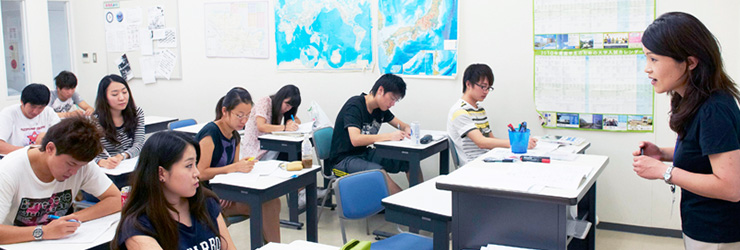University Preparatory Curriculum

Features
- Equivalent to General Course
- No extra costs necessary for EJU preparation classes
Outline
In our University Preparatory Curriculum, students study the Japanese language long-term on a student visa. This course is approved by the Ministry of Education, Culture, Sports, Science and Technology and allows students with fewer than 12 years of education in their home countries to earn the qualifications to attend Japanese universities. Furthermore, students can take prep classes for the Examination for Japanese University Admission for International Students free of charge. The Japanese curriculum and career support in this course is equivalent to those in the General Course.
| Eligible students | •Students who have graduated from high school, but have only 11 full years or less of schooling •Those who are highly motivated to learn Japanese and Japanese culture •Those who are physically and mentally healthy and willing to attend classes diligently |
|---|---|
| Level | All *The initial class level students study at is decided by our placement test |
| Visa | Student: 1 year and 3 months (First time issued) |
| Beginning Period | April & October (Graduation is in March) |
| Course Duration | April intake: 2 yrs; October intake: 1 yr 6 mos. |
| Class Hours | Halftime system of morning or afternoon classes (Total time of Japanese classes per year is around 800 hours) •Morning Classes 9:00~12:20 (45 mins x 4 classes), 5x a week (Mon - Fri) •Afternoon Classes 13:10~16:30 (45 mins x 4 classes), 5x a week (Mon - Fri) |
| Learning Content | •Comprehensive Japanese •Preparation for the JLPT •Preparation for the EJU |
| Application Period | •April intake: early Sep - mid-Jan •October intake: early - mid-July *Application will be closed when it reaches the capacity |
Curriculum
Please check here for details on our curriculum.
Support for Pursuing Higher Education
Please check here for details on our support for pursuing higher rducation.
Tuition
|
2 yrs |
1 yr 6 mos. |
||
|---|---|---|---|
| 1st year | Screening Fee | \20,000 | \20,000 |
| Enrollment Fee | \65,000 | \65,000 | |
| Class Fee | \756,000 | \756,000 | |
| Facility Fee | \40,000 | \40,000 | |
| Subtotal | \881,000 | \881,000 | |
| 2nd year | Class Fee | \756,000 | \378,000 |
| Facility Fee | \40,000 | \20,000 | |
| Subtotal | \796,000 | \398,000 | |
| Total | \1,677,000 | \1,279,000 | |
*Textbook costs are included in the tuition.
Regarding admission procedure and inquiries
